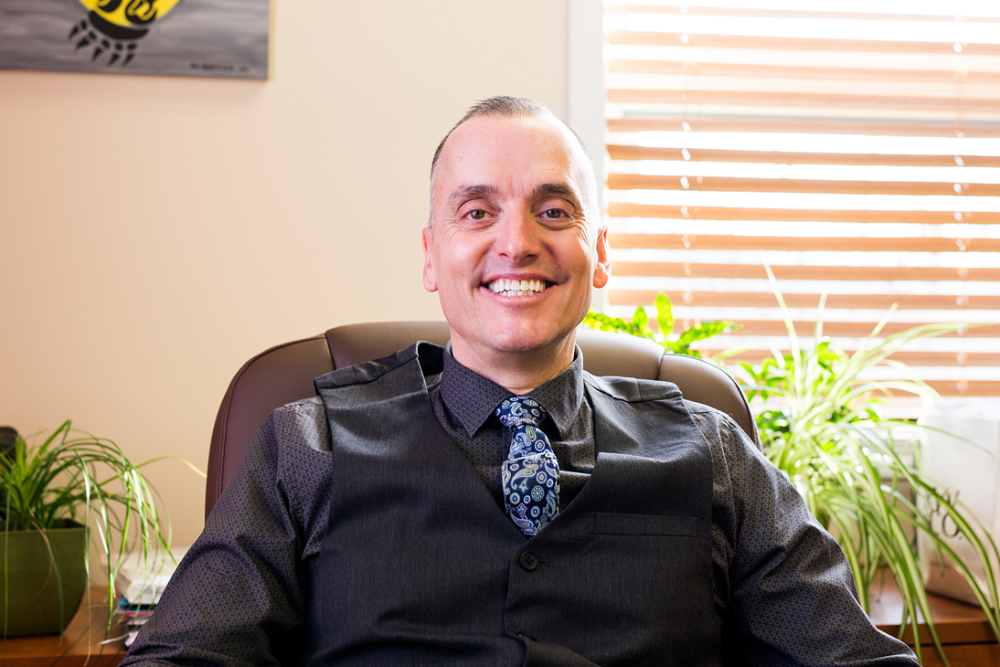Innovation in Addictions Management: A Fresh Start at Thunder Bay’s Shelter House
by the North West Local Health Integration Network
 Gary Mack, Executive Director of Shelter House.
Gary Mack, Executive Director of Shelter House.The new year is often said to be a time for fresh starts and new outlooks, and in 2017 that was certainly the case at Thunder Bay’s Shelter House. Following the announcement that the North West LHIN will provide $185,000 in new funding for Shelter House’s Managed Alcohol Program (MAP), the community in Northwestern Ontario took notice, with plenty of positive media coverage and excitement surrounding this innovative program.
MAPs provide residents with regular doses of alcohol, along with other supports, to help them manage their addiction and to keep them safe. The funding provided by the North West LHIN will keep Thunder Bay’s MAP running until June 2017, and will offer an opportunity to conduct a comprehensive review of the program and explore the best possible way to deliver this important service while also examining the possibility of more stable, long-term funding, moving forward.
“We’ve been getting a lot of great coverage,” says Gary Mack, Executive Director of Shelter House. “We’re actually an organization that’s often in the public eye, but we’ve been getting great feedback, especially about the MAP. When it first started, it was controversial but it doesn’t feel controversial anymore. People recognize that there’s a need for managed alcohol programming, and I don’t find myself defending it. It’s a different world now, and I think people are really understanding. It’s a great intervention, and I think the community is very impressed with what we’re doing.”
That programming has been a lifeline for Ramsey and his friend, Katrina, who are residents at Shelter House and part of the MAP. “The service is excellent here,” says Ramsey, who at one time was homeless and living with an alcohol addiction. “There’s a strong sense of community, and the people here have really helped us get back on our feet. We have stability, we get healthier meals, and we’re more comfortable and our lives have a healthy routine.”
Stories like that of Ramsey and Katrina are not uncommon at Shelter House, which provides a wide range of services and more than 18,000 meals a month to those in need. By creating a welcoming and stable environment that helps Thunder Bay’s homeless population to develop their independence and reclaim their health, initiatives like the MAP are giving residents like Ramsey and Katrina a second chance.
“We serve residents breakfast and help them manage appointments, their medications and their daily routine,” says Jussi Jousmaki, a support worker who has been at Shelter House for more than eight years. “I studied Aboriginal Law, and I could have easily ended up in a different line of work. But after finding out about Shelter House and the work being done here, I fell in love with the programs and the people and realized this is somewhere I could really make a difference. We’re working to not just make people healthy physically, but also spiritually.”
That holistic approach has proven to be life-changing for people like Ramsey and Katrina, and to the community at large. With a renewed, positive interest around Shelter House and the positive impact it is having in the City of Thunder Bay, the people of Northwestern Ontario, including the city’s homeless, are being given a chance to realize better health outcomes and improved quality of life.
“You can’t get well if you’re in chaotic, unstable conditions,” says Gary. “It can be busy and hectic here, at Shelter House, but there’s a stability here that gives people an opportunity to make positive changes. One of our first residents to take part in the MAP is now working in health care in her home community. She came to visit at Christmas time and made a donation here because she was so grateful for the experience that she had here. It’s a remarkable story.”
Kenora Managed Alcohol Program
The North West LHIN is also funding a MAP in Kenora, which operates through the Morningstar Centre at Lake of the Woods District Hospital.
Kenora’s MAP provides 10 individuals with a safe and secure living situation to physically stabilize, relearn basic skills and reconnect with the community and their families. The program aims to reduce contact with police, emergency department visits, hospital admissions, overall health care costs, and to improve the participant’s quality of life.